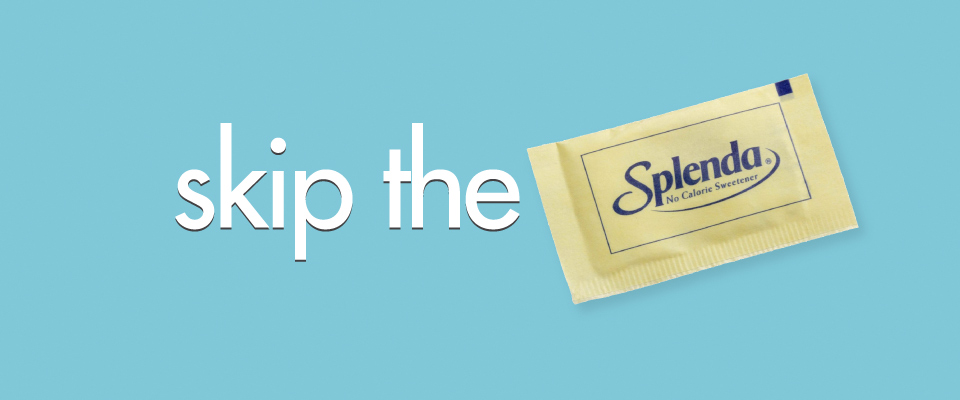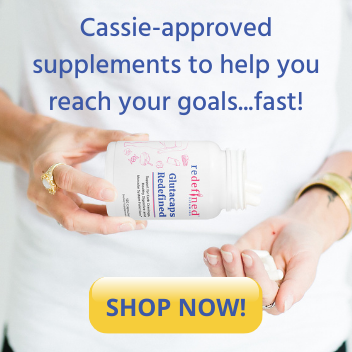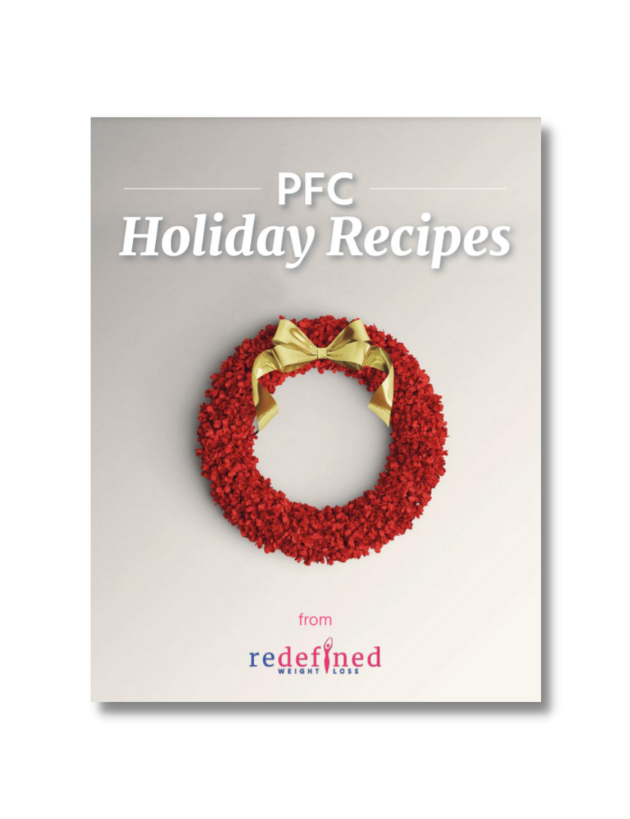This post is an elaboration and clarification of where I stand on the use of artificial sweeteners (which also go by another undercover name: sugar substitutes). One of the greatest health misconceptions revolve around products that use these terms and these chemicals. The reality is that food manufacturers and even healthcare professionals are telling us low-calorie and low-fat is good, while the research is telling us otherwise. All of them—saccharin, sucralose (Splenda), aspartame—they’re all artificial, and they all have some serious consequences associated with their consumption, including weight gain, which is ironic since their main marketing claim is weight loss.
Let’s take a step back and ask ourselves, might there be a connection between the sugar substitute craze (hand-in-hand with the low-fat lifestyle) and the rising obesity rates? Doesn’t it seem too good to be true that foods could taste so sweet and have no negative effect on the body? If it does, that’s because it is.
Here’s why artificial sweeteners backfire: The original logic and promise behind using artificial sweeteners in place of sugar is that they contain no calories, so they’ll help you shed pounds. With this “magnificent” discovery, these magical substances were added to various foods in place of sugar and/or fat to reduce the caloric value. You can find them in products like diet soda, light yogurt, powdered drink mixes, canned fruit, low-fat ice cream, chewing gum, and even vitamins. They are usually in products that flaunt eye-catching terms like: sugar-free, light, lower calorie, diet, reduced sugar, zero, or the one I dislike most: SKINNY. This promise to fulfill your fantasy of getting all the sweet while the pounds melt away is an empty one.
Here’s the hidden problem. Because artificial sweeteners contain no calories, they mess up your metabolism. That’s right, these phony substances actually confuse your metabolism which in turn slows it down and leads to weight gain—exactly the opposite effect you’re wanting when attempting to forgo the calories you get from real sugar.
I’ve always wondered why people aren’t losing weight by consuming these “calorie-free” products. I’ve had clients who normally drink a 12-pack of soda each day, make a complete switch to diet soda, yet don’t lose a single pound. There have been theories relating psychology, claiming that consuming foods said to be lower in calories subconsciously cause us to consume more of others later. I can see the reason for this. I mean, how can one ever be satisfied with a half cup serving of “fat-free” ice cream? Something about all of this never seemed to add up for me. This research suggesting that there may be more to metabolism than the calories in/calories out energy balance model seems to make sense. It also makes sense that ingesting chemical compounds interferes with your body’s metabolism, causing it to run slower than usual, which is why we aren’t losing weight like these products promise.
So what should we do with the mix of information?
5 Strategies to Skip The Splenda:
1. Choose real foods and ditch your “skinny latté.” I’m suggesting you stop buying anything “light” or “lower” in fat or sugar. Buy full fat yogurt and cottage cheese. If you want to have ice cream as a treat, eat a little bit of the real stuff. If you need to sweeten, use plain ol’ sugar, pure stevia, or a better option that gives you an added punch of nutrients too, is Dynamic Fruits & Greens. It’s a great tasting, superfood powder that’s nutrient-packed, sweetened with stevia and both adult and kid-approved! You can add the espresso flavor to your coffee. If I’m at a coffee shop and don’t have any Stevia packets on hand (you can pick these up in the natural section of the grocery store), I ask for ONE of the syrup pumps (“half pumps” is common coffee-shop lingo, but it’s still more sugar than I’d like in my coffee). Take control over what is being added to your beverages and what you are putting in your body.
2. Think in a new way. Because we have been brainwashed by marketing and media for so many years, we need to change our mindsets and how we think about food. Start by remembering that your body was designed to metabolize food, not chemicals. It is better to eat a little bit of the real thing than a lot of the fake thing (chemicals). Think of eating as a way to give your body energy because that’s exactly what you are doing every time you eat. Choose to fuel with foods that are high in nutrients and low in additives and chemicals. Educate yourself with evidence-based nutrition information and break free of the lies you’ve been told. It’s not too late, and your body will thank you!
3. Say “good riddance” to your soda. Or pop. Or cola. Regardless of what you call it, both regular and diet are toxic and should be avoided like the plague. Diet and regular sodas have both been linked to kidney damage, cancer, obesity, hypertension and countless other health risks. If you are the type of person who drinks either type of soda, one of the best choices you can make for your health is to give it up immediately. That being said, I’m going to answer the question a lot of you may be thinking: I am not by ANY means endorsing soda consumption, but if you choose to go against my advice and drink it anyway, regular is the lesser of the two evils (although it is evil, nevertheless!). The reason is because regular soda is made of real sugar, which your body knows how to metabolize. The catch is if you don’t immediately utilize the 67 grams of sugar in that 20 ounce bottle for energy, your body stores it as fat. Diet soda doesn’t have any calories because your body doesn’t know how to metabolize it. Instead, it contains loads of chemicals in the form of artificial sweeteners which are toxic to your body for reasons that go far beyond interfering with your metabolism. Your best choice is to stick with clean, pure water or for something with natural flavor, try seltzer with fruit or an herbal tea.
4. Lose weight in a healthy way. Instead of looking to products that promise fewer calories and fat, if you want to get to a healthy body weight, do it in a healthy way. There are SO many pieces to the metabolism and weight loss puzzle…lab data, activity level, stress level, hormones, thyroid, gut health… and these go beyond the calories/in calories out. Weight loss is not about replacing calories with chemicals; it’s about getting to your root cause, and finding just how to rev up your metabolism so that it can learn to run efficiently gain and your body will naturally try to get back to a healthy weight by shedding excessive pounds. That’s just what we do in our personal coaching program. We specifically address overlooked, never-talked-about elements that are holding you back from your weight loss goal. In our program, we tailor recommendations just for you.
5. Keep it simple. As always, I like to end with saying this because it’s true. Don’t buy into the marketing tactics for “fake foods” that are low in fat and high in sugar and artificial substances. Eat the real stuff, including healthy fat. Fat keeps you full while also supporting metabolism, brain function and (gasp!) weight maintenance and loss by way of keeping you off the blood sugar roller coaster. You need healthy fat to help keep your blood sugar levels balanced so you stay satisfied and full.
Get your free download with my best step-by-step tips for conquering your sugar cravings by clicking the pink button below!












Hey what about Jimmy and his diet soda’s. I often wonder about him drinking that stuff?
I’m not the food police — I try to live by “eyes on my own plate!” 🙂
Good answer!
Do you know of any whey protein powders that don’t contain sucralose, but that also taste good? It seems to be in everything!
Absolutely. That’s is such a concern of mine too, with all of the added sugars, artificial sweeteners and crap. I get a really good one imported from New Zealand because it doesn’t contain any sweeteners, sugar, rBGH (growth hormone) and STILL tastes good. It’s right here: http://www.dietitiancassie.com/naturalprotein
What about Stevia sodas such as Blue Sky? Is there a limit to how much Stevia one should use? I use it daily in my coffee.
Stevia is fine, but I don’t recommend going crazy with it. We don’t have research on long term effects- Blue Sky is not a stevia soda. They market it that way, but the main ingredient is ERYTHRITOL, a sugar alcohol. You can read my thoughts on those here in #1: http://www.dietitiancassie.com/the-truth-on-truvia/
An email friend of mine in England’s husband used to work at Tate & Lyle, where Splenda was first manufactured. When he retired, he had to sign a type of Non-Disclosure statement to not disclose what he knew about the details about Splenda and how it’s made…..My friend and her husband will not touch Splenda (sucralose) with a ten foot pole…….I personally know that bleach or chlorine is involved in making Splenda……This all really SUCKS, since Splenda has a great taste you can (for example) dip strawberries in and eat….
GROSS!!!!! Thanks for sharing.
Yes! We recommend pure stevia. I use this one: http://amzn.to/1EpiCLT